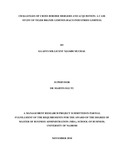| dc.description.abstract | Cross border mergers and acquisitions are becoming a strategy of choice for organizations
attempting to maintain a competitive advantage. Goals for this increasingly popular strategy converge around themes including growth, diversification, and achieving economies of scale. Obtaining a global presence is also acknowledged as a motive for cross border mergers or acquisitions. The prime reason for cross border mergers and acquisitions are to maintain or increase the market share and to increase shareholder value by cutting costs and initiating new, expanded and improved services. Corporations spend billions of dollars annually in pursuit of this strategy; the success rate, however, is less than commendable.
The purpose of this study was to determine the challenges of cross border mergers and acquisition at Tiger Brands Limited (HACO Industries Limited) and to establish strategies adopted to help cope with challenges of cross border mergers and acquisitions. This is a case study since the unit of analysis is one organisation. The researcher personally distributed the interview guides among sampled employees currently employed in Tiger Brands Limited; the researcher aimed to collect information across all levels of employees i.e. top management, middle level management and subordinates. A qualitative analysis was employed.
The study concludes that reasons for the acquisition of HACO Industries by Tiger Brands SA included perceived synergies, wider product scope and Tiger Brand was looking for a new market for its products. Following the acquisition, staff morale was low and uncertainty regarding job security was rife. One of the challenges experienced in bedding down the new structure was redundancies, which was addressed by offering retirement packages and for those who did not take up retirement packages, excess capacity was re-deployed. The study further concludes that that corporate culture plays a key role in the acquisition process in that it dictated the ease with which the two companies interact.
The study recommends that the government should increase incentives to foreign companies seeking to enter the market by introducing tax holidays. The researcher also recommends that small companies should adopt mergers and acquisitions to enter new geographical areas and to diversify their business growth | en_US |

